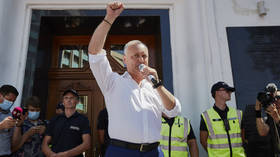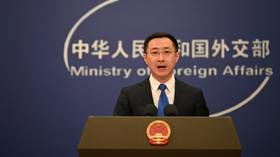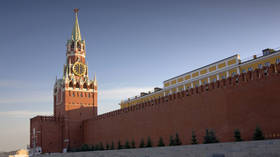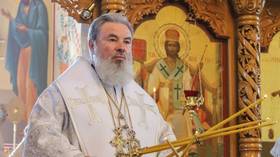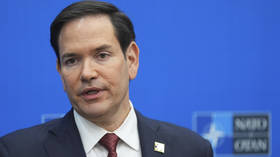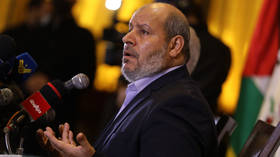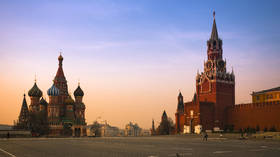‘Russia has no imperial ambitions’ – Gorbachev
If it were not for Russia, the USSR would still exist, and Vladimir Putin has also definitely confirmed that Russia doesn’t want to create a new empire, former president of the USSR Mikhail Gorbachev said to RT.
RT: Mr. Gorbachev, you have recently become a great-grandfather.
Mikhail Gorbachev: Yes, about a month ago.
RT: Did this have a major effect on your life?
M.G.: Not every man achieves this status. When a correspondent from Komsomolskaya Pravda interviewed me, she even told me: “Do you realize how privileged you are? You will now be allowed to go straight to heaven, without any further inspection.” This is probably supposed to mean that great-grandfathers are few. I told her, “Well, what do I do when I get to heaven? Shepherd, or a flock of sheep? That’s not for me.”
Seriously, though, it’s nice. Our family is still very close. We haven’t scattered. In our family, each person knows they’re not alone – always, come rain or shine. We all sold our flats and bought a common house.
RT: Do you realize that you are becoming increasingly popular these days?
M.G.: That is good. Not for my sake – because I’ve had enough trouble in my lifetime. I’ve often had to deal with false accusations, and I’ve never allowed them to get in the way of what we were doing. I believe people begin to understand this more and more. People have created many myths and legends that aren’t true. Raisa suffered very much because of them, because she could not stand lies. She was a victim of those lies. She realized that as a president’s wife, she should conduct herself and work in such a way as to be of help to people, to society – she worked in the Culture Council.
She couldn’t just sit doing nothing. That was typical of our generation. Of course, that was different from what happened before. In fact, that was the key attribute of the Gorbachev team: it was a new generation.
RT: Including their wives?
M.G.: Yes, the wives were on a par with their husbands. Initially, people could not take it. But when she was dying in a hospital in Munster, many newspapers published articles about her, and several thousand letters came from all over the world. Unfortunately, I couldn’t show her the newspapers: the hospital had very strict rules. When a person has leukemia, their immune system stops functioning, and they have to take medicine to suppress infections. Still, I brought her a copy of Izvestia. It was a small article, entitled ‘Lady Dignity’. I read it to her. She was in tears. She said, “Did I really have to die for people to understand me?” I still cry every time I remember this.
RT: When do you think the world was a safer place, when your granddaughter Ksenia was born, or now when your great-granddaughter is born?
M.G.: You know, it’s an interesting question. In 1980, none of us was at the top level yet. We were all still working at our old jobs. So, in 1980, tensions were very high. Essentially, nuclear war was a constant threat. So, at that time, the world was a very dangerous place. Piles of nuclear arms had been accumulated. From time to time, there were failures in the system for managing nuclear weapons. In fact, we did what we did during the perestroika years because of the impression we received during those times and our analysis of that situation.
Eventually, we started working to create an atmosphere of trust. ‘Doveryai no proveryai’ – ‘trust but verify’ – that’s the phrase Reagan learned to say in Russian. Anyway, to answer your question, this was a difficult time. Now the situation is different. There are not as many nuclear weapons.
But still, what’s left is enough to destroy the world more than once. Also, weapons are being perfected all the time. So the danger today is serious once again. Essentially, what we see today is militarization, the signs of a new arms race. That’s terrible, just terrible. All the positive things we had achieved: our ability to reach an understanding with Americans, responsible behavior on both sides – all this has now been lost.
So, the challenge today is that while we, the people who helped the world come out of the Cold War, are still alive, together with the new generation, we should find a solution again.
RT: You just said that relations between the Soviet Union and the United States were much more difficult then. But still, you were able to find a common language, create an atmosphere of trust and act responsibly. Why is it so difficult to do the same today? Why is it nobody seems to be able to do the same today?
M.G.: Personally, I believe it’s a question of who’s in charge. Even in dealing with national problems, like the current crisis, many people at the top clearly lack competence, responsibility, and wisdom.
RT: Some say that in your time, policy-makers acted upon their ideas, and in our time, they act according to the interests of large corporations. What do you think is the difference between politicians of your era and those of today?
M.G.: I think, first of all, morally. Now the moral is to gain as much as possible. They were just robbing Russia. I still can’t forgive them for doing that. And I can’t forgive myself for being too liberal and didn’t send Boris Yeltsin where I should have. That was my mistake. Misjudgments about staff are the most serious ones. These mistakes are followed by political mistakes. And then politics have grave consequences. Why did I highly esteem and support Putin in the beginning? – Because Russia was falling apart.
And who knows what could have led to, what kind of catastrophe, and not just in Russia. The country is loaded with all kinds of weapons. He had more important things to do than studying the basics of democracy. He needed to consolidate and keep power. What kind of power is it when two thirds of the republics in their constitutions ignore the constitution of the Russian Federation? That is a total failure. The army was falling apart, the education system was failing, science – everything. What Putin did in the first period of his rule will go down in history.
RT: Is there anything that you totally disagree with as far as what Putin and Medvedev have done is concerned?
M.G.: I have serious issues with the party policies – how parties are created and managed, because a parliamentary system is the basis for democracy. Political parties express the diversity and interests of different social groups. This has not been successful yet. What is this United Russia party? They say they are the ruling party. It is just a crowd of bureaucrats and it’s true! And as far as I go, I wrote about it in Rossiyskaya newspaper. What they have done with the electoral system is very bad. If anyone thinks that this modernization could be done by willpower or by efforts of some group, no, it is wrong.
Society should know and participate, and that will guarantee success. Putin is trusted so far, but there are already some disturbances. And the most important thing is to make the electoral system truly democratic and open, so that people can really participate. What Dmitry Medvedev suggested is not quite the same.
RT: You were in America just recently where you’ve received the Martin Buber prize. He built his philosophy around the importance of dialogue. You put so much effort in building this dialogue with the West. You ended the Cold War – what does it do to you to see what’s happening now between Russia and the US?
M.G.: Well, ‘hurt’ is a soppy word: it means you are not a politician. I take everything that is going on to heart, because much has been lost in foreign policy which, once upon a time, had allowed us to end the Cold War and open the door for possible co-operation and building of the new world order.
It was incredible. There had never been such achievements before. The doors for democratic changes opened in Russia as well. So I take to heart what is happening in the country as well. I am a live person, not some mummy.
RT: Whose fault is it? Russia’s or America’s?
M.G.: I said all these things in America. They asked for my advice in the current situation. I said – you know, I am not really on the list of your advisors. But since you asked this question, I cannot ignore it. When we met with your presidents – Reagan, George Bush Sr. – a lot needed to be overcome. And through dialogue we were able to solve issues that were far from any kind of trust relationship. We thought that it was impossible to stop the arms race, but we did it. I said this at a university with 12,000 people present and I will say it again: America needs its own perestroika. The audience gave me a standing ovation. So I thought – here, there must be something going on in America that will spill out.
To elect Obama – a younger man, a representative of another race – is unheard of for America. But they realized that only this person can go for changes. Everybody is expecting change.
RT: What do you think about him?
M.G.: I have been watching him. And I think he is a very capable man, which can make up for the lack of experience. And his actions already tell us that he is a smart person, insightful. He is building a team of very experienced people. As far as if he will have enough resources to stage a change – and I think major changes are needed – I don’t think he will be able to orchestrate major changes.
RT: Why not?
M.G.: Such is America.
RT: What do you think of president Medvedev’s speech on the day of the American election?
M.G.: I don’t know how it happened that everything was on the same day. Don’t know who moved the dates. I don’t think it was the best idea, although I don’t see anything particularly bad in that. They were two events in the lives of partners who keep trying to figure out their relationships. I would wish to the Russian leaders as well as the Americans to use this change, when new people came into power, have patience and try to look for the agenda needed for Russian-American relations.
RT: There are two popular opinions. In the west it is common to think that Russia does not want to be flexible, has imperial ambitions and is trying to resurrect the Soviet Union. In Russia we think that we are just trying to strengthen our position and support our principles.
M.G.: I think nobody in Russia was going to war with America. We did not plan it either when we were in power. And it is still true. Everybody saw how hard Putin tried to fix relations. His decisions during the famous September events, concerning the war on terrorism objectives – he went really far.
He supported Bush, and he is still continuing the course of co-operation. But not so on the other side. Their approach was – finally, here is our chance. All our competitors, including Russia, are in bad shape, so we should grasp as much as we can. And they made all those one-sided decisions. The majority of Americans were against the war in Iraq, millions protested in Europe. The Security Council was against it – Russia, Germany, France, all the major forces. I think they made a strategic mistake. It is impossible to succeed with the ambitions to rule the world.
The idea of a new empire contaminated all of America. Under Yeltsin, Russia was on its back, it was a broken economy, people were not getting paid, there were no jobs. Everyone came here and applauded Yeltsin. That was when Russians realized what everybody wanted from them – to keep them on the leash, like a bunch of nobodies.
But this cannot happen to Russia. And now when Russia begins to make declarations, they get cranky. Because they were used to telling Russia what to do.
RT: Besides Russia, there are other strong countries coming onto the world arena – China, India, Brazil – that are also very different from the western countries. But for some reason all attention is drawn to Russia. What is it: Russophobia or Russophilia?
M.G.: Definitely not love, not hatred either. It comes from understanding the reality. Russia has a great history, great resources and is a country that still has strong weapons. Russia’s position is important. But I also think it is important for Russia who it will be with. Co-operation with Europe and the United States is important, but we also have other neighbours, such as Iran, Turkey, India, and China.
RT: What about the CIS?
M.G.: That’s number one.
RT: So is it more important for Russia to consolidate the CIS and create a common economic zone more than being a part more global processes?
M.G.: We were close to creating a common economic zone, when Kuchma was still in power. These four countries – Russia, Belarus, Ukraine and Kazakhstan had 80% of the potential of the whole Soviet Union. It was a great force. And if you look at all the natural resources… But then many things got in the way of this process – Caucasus, Ukraine. They keep thinking that Russia wants to create a new empire.
RT: And is that not so?
M.G.: Not at all. Putin was giving an interview to Le Figaro. He got the same question about imperial ambitions. His answer was a definite no. Russia’s position defined the fall of the Soviet Union. If it were not for Russia, the Soviet Union would still exist. This was the first time I heard this revelation from Putin. I think we need economic co-operation.
That’s why there was the need for that agreement that we had prepared, but the Coup stopped it. EU is in essence this kind of state with a united economic zone. Although in our draft we went further and planned to centralize the military system. It would also be a good thing, because EU is trying to figure out how to have common forces, they cannot defend themselves without the United States.
RT: Will Russia ever be able to become a member of EU, what do you think?
M.G.: I met with Helmut Kohl two years ago. We gave our addresses to the audience. It was a very interesting topic – a person in uniting Europe. Somebody said – if so much is connected with Russia, Russia should join the EU. And my friend Helmut, who is quite heavy, jumped up and cried out – what are you talking about?! Neither side is ready for that. We need to go through certain stages. So Kohl was right, even though his response was quite emotional. It is understandable – if Russia joins EU, Germany’s position will be weakened. Now they set the tone. So it is not totally impossible, but some changes should take place first. EU is temporarily not taking any new members.
We on our part can have a successful co-operation with them. Russia and the EU – this could be an advanced strategic partnership. But this should be taken seriously. Not like when Russia makes certain steps in response to a threat, and they get all cranky, like some ladies. Europe has to be respectable and responsible. Russia takes Europe into consideration when making plans. Modernization can be successful, if it is based on co-operation with Europe, first of all.
RT: You are the only Russian politician who said that it was wrong for Russia to recognize the independence of Abkhazia and South Ossetia. What do you think about this conflict and those events?
M.G.: I am tired of these Georgians. I love them just like Russians. And I am glad that through all these things Russians have not gotten disappointed in Georgians and Georgians have not been disappointed in Russians. Your grandfather and I celebrated the anniversary of the Treaty of Georgievsk. It is such a big thing. There is a lot of talk about Russia enslaving Georgia. We never occupied them. And there are so many Georgians who went down in Russian history. Every time I go to and from work, I drive past the monument to the Bagration, the Georgian who was a hero of the 1812 war. There is so much to remember about the relations between Russia and Georgia. And even now – do you know how many Georgians live in Russia?
RT: About a million.
M.G.: When WWII was over, the English wanted just to erase the German race. Americans wanted to split them into several states. And we were for a united Germany. If a union modeled after the EU is created, with Ukraine, Belarus and Georgia in it, then something new will emerge.
RT: Is it possible, is it realistic now?
M.G.: Not now, but at some point those who refuse will leave. It is possible. But even polls show that this should not be one state. We need to have economic co-operation.
RT: Every great empire is doomed. You were the last leader of the Soviet Union. If you could go back, would you change anything?
M.G.: Of course. We needed to reform the party. We had one party and everything was based on it. And we needed to decentralize the Soviet Union right away, give rights to independent states, but to keep what I called the democratic confederate state. One administrative issue – we needed to raise salaries for teachers and such and figure out pension plans, because they were just terrible. And at the same time oil prices fell to $US 10-12. Saudi Arabia did it upon Reagan’s request. So we were stabbed in the back.
So we should have taken $US 15-20 million from the military budget, and this would have released the tension over the market. Because while you have goods in the stores, people will support you and won’t care about fights for power. So no matter what people say about Putin, he will have support while everything is available.
RT: Do you feel nostalgic about the Soviet Union? What do you miss about those times?
M.G.: Of course, I really regret the loss. I wrote several books saying that it was possible to keep the Union. But it is interesting – the polls show that most people would not want to go back. But co-operation is a different thing. It is a new situation.
And when this co-operation occurs, there is no need for placing missiles systems, because NATO is part of the whole, and many other issues become unnecessary. But that is just an idea.
RT: Do you think you could lead today’s Russia with your world view?
M.G.: No, I have worked my time. I can help, give advice, participate, which I do, but the new generation should take over. It is important to leave politics, the stage, at the right time.
RT: Are there friends in politics? Or just like-minded people?
M.G.: Of course there are, I was friends with your grandfather. We go way back, and it was not coincidental that we ended up here.
RT: My grandfather likes to say that no political post is worth a human life.
M.G.: My team had a credo – “everything without blood”.
RT: You happen to be the last liberal left – the last of the Mohicans!
M.G.: We did not finish, but perestroika was stopped at the point of no return.
RT: Everyone wonders what’s your life like now? What is the life of the last president of the Soviet Union like?
M.G.: I like to go to the seaside, to other countries. My whole family goes. Last year I didn’t go because of health issues, I just stayed at my summer house. My health is gradually getting worse.
RT: What was the last book you read?
M.G.: I don’t read many books any more, but I watch a lot of movies. I like our movies and American movies, French films. I enjoyed Lungin’s films. We were friends and even have some plans together.
RT: Do you listen to music in the car?
M.G.: I mostly listen to news. There is one music radio that I listen to – Classic.
RT: Everyone is curious about this – do you have a Louis Vuitton bag?
M.G.: No, no one finances me. There is a Yeltsin fund, for example. I don’t have any of that. I totally provide for myself. I also look for sponsors. My fund has a lot of work. I have to travel a lot, give lectures, they are all paid.
RT: Did you know that on that photo of the Luis Vuitton ad with you on it, in the bag you had a copy of a magazine with Litvinenko on it?
M.G.: I didn’t know… it’s a coincidence! They probably knew about it!
RT: Do you believe in God?
M.G.: I recently answered this question. I was visiting a monastery in Italy, and then newspapers wrote that I converted to Catholicism. I said that wherever I go, I visit religious places – Buddhist temples, synagogues, mosques, and so forth, because this is all culture. I have been baptized. But I have always been and still am an atheist.
RT: Is it true that your name has been changed from Viktor to Mikhail?
M.G.: My parents called me Viktor, but my grandfather took me to a nearby village to get baptized. And he asked the priest to name me Mikhail. I don’t even know why an illiterate farmer did that – Mikhail is a Jewish name, and it means ‘equal to God’.
RT: Do you believe in destiny?
M.G.: Of course, but I think it is circumstances. I don’t have a fatalistic view of history. No one can turn around history. People who manage to understand the tendencies and fit into this process of history are lucky. I think we were able to understand at least some positive trends.
RT: What three events do you see as the most important in your life?
M.G.: When I was born, when I graduated from the Moscow State University, and when I met and married Raisa.



